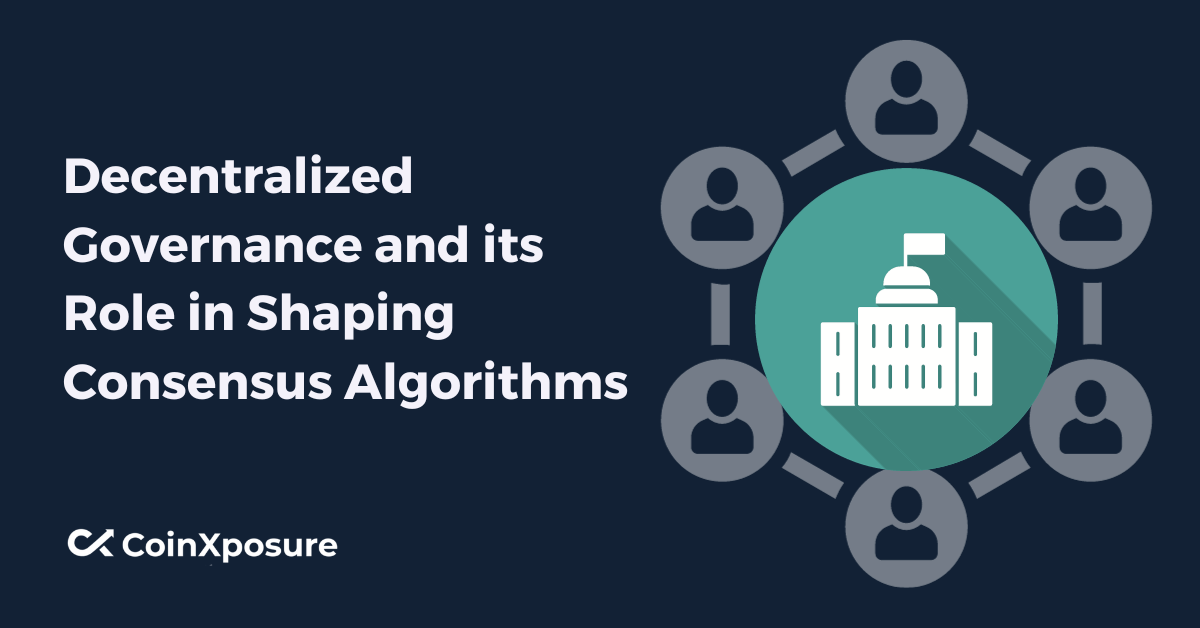
Decentralized Governance and its Role in Shaping Consensus Algorithms
Decentralized governance, a cornerstone of many blockchain ecosystems, involves the collective decision-making of participants rather than centralized authorities. In shaping consensus algorithms, it plays a pivotal role by fostering transparency, preventing concentration of power, and enabling adaptive protocol changes.
This article explores how decentralized governance influences the design and functionality of consensus algorithms, emphasizing its significance in promoting a fair, secure, and community-driven approach to blockchain development.
Decentralized Governance Principles
Decentralized governance is guided by principles prioritizing the equitable distribution of decision-making power, transparency, accountability, and inclusivity. These principles are foundational to the functioning of blockchain networks and their consensus algorithms.
Here are key decentralized governance principles:
- Distribution of Decision-Making Power
- Transparency and Accountability
- Inclusivity and Participation
- Rule of Code
- Sybil Resistance
Distribution of Decision-Making Power
Decision-making authority is distributed among network participants, reducing reliance on a central authority.
Power is often proportional to the stake or contribution of individuals within the network, ensuring a fair distribution.
Transparency and Accountability
Governance processes and decisions are transparent, visible, and accessible to all participants.
Participants are held accountable for their actions, fostering a sense of responsibility within the community.
Inclusivity and Participation
Governance mechanisms encourage broad and diverse participation from all stakeholders.
Inclusivity ensures that decisions reflect the diverse perspectives and interests of the community, avoiding concentration of influence.
Rule of Code
Governance rules are encoded in smart contracts or protocols, ensuring they are executed automatically and transparently.
This minimizes reliance on human intermediaries and enforces a more objective and predictable decision-making process.
Sybil Resistance
Mechanisms are implemented to prevent Sybil attacks, where a single entity creates multiple fake identities to gain disproportionate influence.
Sybil resistance ensures that decision-making power is allocated based on genuine participation rather than the ability to create numerous identities.
These principles collectively form the basis for decentralized governance, shaping the way decisions are made, implemented, and sustained within blockchain ecosystems.
Role in Shaping Consensus Algorithms
Decentralized governance plays a crucial role in shaping consensus algorithms within blockchain networks. These governance mechanisms influence how decisions are made, updated protocols, and the overall system functions. Here’s how decentralized governance contributes to the shaping of consensus algorithms:
- Decentralized Decision-Making
- Resistance to Centralization
- Community Involvement
Decentralized Decision-Making
Impact on Block Validation: Governance mechanisms determine how nodes reach consensus on validating transactions and adding blocks to the blockchain. Decentralized decision-making ensures that no single entity controls this process, promoting fairness and security.
Adaptive Protocol Updates: Governance allows for implementing changes and upgrades to the blockchain protocol. Decentralized decision-making ensures that updates are responsive to the evolving needs of the network, enhancing its efficiency, scalability, and security.
Resistance to Centralization
Prevention of 51% Attacks: Decentralized governance helps prevent concentration of power by discouraging entities from controlling most network resources. This resistance to centralization is crucial in preventing 51% of attacks, where a malicious actor could control most of the network’s mining power and potentially manipulate the blockchain.
Robustness Against Single Points of Failure: By distributing decision-making authority across the network, decentralized governance reduces the risk of a single point of failure. This enhances the system’s resilience against attacks, technical failures, or malicious activities that could compromise the integrity of the consensus algorithm.
Community Involvement
Token Holder Voting: Many decentralized governance models include token-based voting, allowing token holders to participate in decision-making. This ensures that decisions align with the interests of those invested in the network and distributes influence based on the extent of participants’ contributions.
Governance Proposals and Improvements: Community members can suggest changes or improvements to the consensus algorithm through governance proposals. This participatory approach encourages a diverse range of perspectives and expertise, fostering innovation and adaptability.
Decentralized governance serves as a guiding framework for consensus algorithms in blockchain networks, emphasizing fairness, transparency, and the active participation of the community.
By distributing decision-making authority and involving stakeholders in protocol updates, decentralized governance contributes to the robustness and evolution of consensus mechanisms, making them more resilient and responsive to the dynamic nature of blockchain ecosystems.
Challenges and Criticisms of Decentralized Governance
While decentralized governance brings several advantages to blockchain networks, it is not without its challenges and criticisms. Understanding these issues is crucial for improving governance models and ensuring the long-term success of decentralized systems. Here are some challenges and criticisms associated with decentralized governance:
- Coordination Difficulties
- Risk of Governance Capture
- Balance Between Decentralization and Efficiency
- Lack of Legal Frameworks
Coordination Difficulties
Decision-Making Delays: Achieving consensus in a decentralized community can be time-consuming, leading to delays in implementing necessary updates or addressing critical issues.
Coordination Challenges: Coordinating actions among a large and diverse group of participants can be complex, making it challenging to implement timely and efficient decisions.
Risk of Governance Capture
Influence Concentration: There’s a risk of influential entities amassing a significant portion of tokens or voting power, leading to a form of governance capture where decisions primarily reflect the interests of a few powerful stakeholders.
Manipulation and Collusion: Malicious actors may attempt to manipulate governance processes or collude to gain disproportionate influence, undermining the democratic principles of decentralized governance.
Balance Between Decentralization and Efficiency
Scalability Concerns: As networks grow, maintaining a high level of decentralization while ensuring scalability becomes challenging. Some governance models may compromise decentralization for the sake of efficiency.
Resource Intensiveness: Certain decentralized governance mechanisms, such as on-chain voting, can be resource-intensive and may pose scalability challenges.
Lack of Legal Frameworks
Regulatory Uncertainty: In many jurisdictions, decentralized governance operates in a regulatory gray area. The lack of clear legal frameworks may hinder broader adoption and expose participants to regulatory risks.
Understanding and addressing these challenges is essential for improving the effectiveness of decentralized governance systems. Ongoing research, experimentation, and community involvement are key to developing governance models that balance decentralization, efficiency, and security.
Conclusion
Decentralized governance stands as a transformative force within blockchain ecosystems, shaping the very fabric of consensus algorithms and decision-making processes.
As a guiding set of principles, decentralized governance introduces a paradigm shift away from traditional, centralized authority models, promoting transparency, inclusivity, and resilience. This innovative approach is not immune to challenges and criticisms despite its merits.
The coordination difficulties inherent in decentralized decision-making, the potential for governance capture, and the delicate balance required between decentralization and efficiency all underscore the evolving nature of these governance models.
Striking the right equilibrium between immutability and flexibility is an ongoing challenge, as is addressing the legal and accessibility barriers that may hinder widespread adoption.
As blockchain technology matures, decentralized governance will likely see further refinement and innovation. The lessons learned from challenges and criticisms will guide the development of governance models that are more resilient, adaptable, and accessible.
In this dynamic landscape, the collaboration of diverse stakeholders remains crucial to shaping the future of decentralized governance and its enduring impact on consensus algorithms in blockchain ecosystems.





